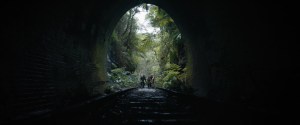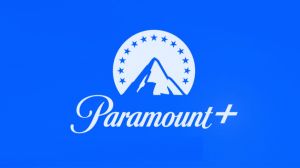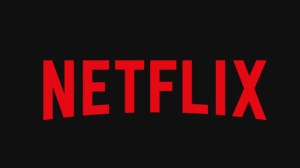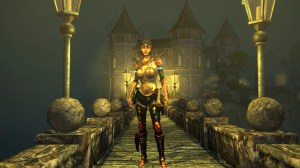To call The Blazing World an ambitious endeavor for Carlson Young would be quite an understatement, as the surrealist adventure saw Young pulling triple duty, having starred, directed, and co-written the blend of horror and fantasy. With audiences likely more familiar with her acting work, having starred in projects like Scream: The TV Series and Emily in Paris, The Blazing World marked Young’s directorial feature debut. Luckily, Young knew just how ambitious an undertaking bringing the story to life would be that she initially delivered audiences a short to prove the potential of the longer narrative, with that 2018 short ultimately paving the way for this feature. The Blazing World hits theaters and On Demand on Friday, October 15th.
Videos by ComicBook.com
Decades after the accidental drowning of her twin sister, a self-destructive young woman (Young) returns to her family home, finding herself drawn to an alternate dimension where her sister may still be alive. Through an epic journey down the darkest corridors of her imagination, she tries to exorcise the demons pushing her closer and closer to the edge.
ComicBook.com caught up with Young to discuss her love of surrealist horror, the biggest challenges with the feature, and the one hope she still has for the Scream franchise.
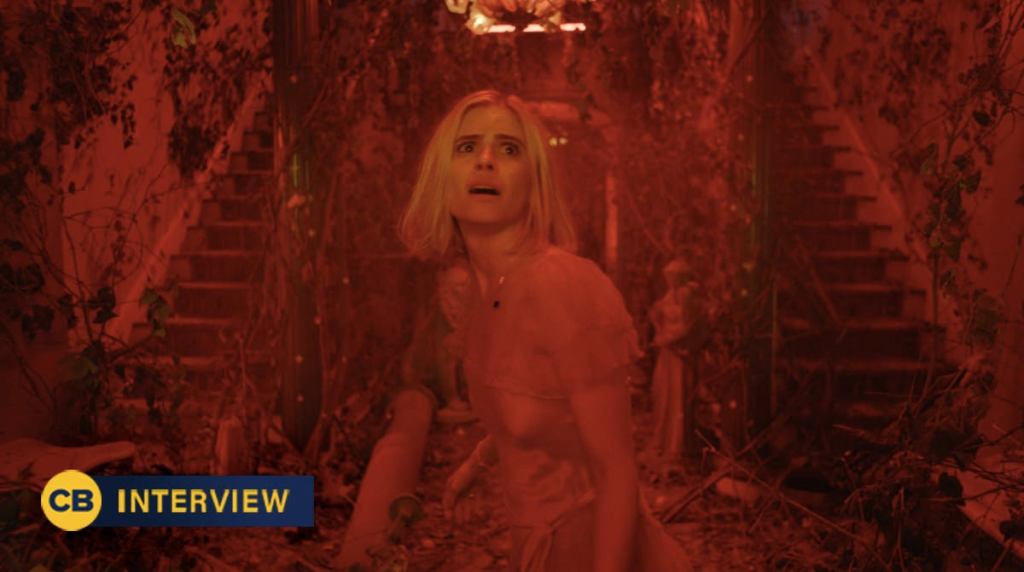
ComicBook.com: I know that not only with The Blazing World and the inspirations while making it, but just you personally as a horror fan, that you’re big into Dario Argento and the Italian giallos. Do you have a favorite Dario Argento movie or, if you can’t narrow it down to just one, if there was a reboot being made, one that you would like to get involved in?
Carlson Young: Oh man, that’s hard. I would never reboot an Argento movie. That’s sacrilege, I feel. But Inferno I think stands out to me a lot, that’s the first thing that came to my head. So I’ll just stick with that.
We can get started, just throw a bunch of cats at you. I think in 2021, there might be a more humane way of filming that movie.
I don’t know if you know this, but I’m extremely method, so I would prefer just cats, regular cats.
Speaking more to your film and your interest in surrealism and nightmare-logic, as a fan and as a filmmaker, what is it about that world, that aesthetic, that storytelling that just really appeals to you so much more than a cut-and-dry, straightforward experience?
Surrealism is just art that speaks to the subconscious and this dream-logic space is really powerful to me because I am a lucid dreamer, quite often. [Alejandro] Jodorowsky and these filmmakers who … When I saw El Topo and The Holy Mountain for the first time, I was just like, this is the first time I’ve ever seen a film that, it’s speaking to this other part of my brain that needs content. I knew that it really situates dream-logic into the waking life, and it’s really a powerful and magical spell that is cast because of that. I think just because I have such a rich dream life, that speaks to me really deeply.
While you’re actually making this movie or just developing it or making the short, did the filmmaking process enter your dreams much? Did you pull stuff directly from your dreams into the story?
Oh, my God, I can’t even … I could talk about this for hours. Yes, yes, absolutely. I just wrote an essay for Talkhouse about that, it outlines that. But yeah, I love horror and genre, but specifically fantasy, and I just realized that I was writing my inner child’s interpretation of a traumatic event and this space where classic fantasy motifs are influencing and speaking to the inner child and inviting the inner child into this film space and letting them lead. That was a really, really fascinating way to enter the script process.
Do you find that, as an artist, is that helpful or can it be sometimes–
Unhealthy?
Unhealthy, you could say, that your brain is so attached to the story you’re bringing to life. Obviously, some movies, some TV shows you do, they’re more, “Oh, this is a fun thing.” But when it’s an all-consuming experience, what is that like? How do you even let go of that?
Oh, man, I don’t know. I’ve been trying to let go and come down from it for months, but I think, just with the first one, it was obviously an ambitious story and an ambitious script to do out of the gate, but I just ran onto that battlefield, just battle cry, like, “I can do it, I can do it.” I was really brave, but at the same time, a lot of just … zero boundaries between myself and the work, and it was all blurring and bleeding in between these spaces. I’m really excited to keep going down the filmmaking path and do my second and third and fourth and fifth, because I will always be sourcing this experience for both its healthy parts and its unhealthy parts, and learning, and setting healthy boundaries between myself and the work.
With these surrealist, nightmarish horror movies, as opposed to more straightforward ones, you really have to be super precise about the tone, with the writing, the performers, the music, the cinematography, because if you tip too far one way, it could lose the gravitas, or if you go too far the other way, you lose that charm of that dreamlike state. For you as a filmmaker and as a performer in it, how did you find that tone? Was it fine-tuning literally every part of the process on set? Did you find it more in the edit?
I think that the answer is somewhere in the middle. A lot of it was in the edit, but just on set and keeping myself honest, I was fortunate enough to have an amazing assistant, Sarah Kirby, who was really keeping me on balance in terms of just the character of Margaret, and then gauging the other actors and making sure … I swear I asked her to master an energy map, so no matter where we were — we were obviously shooting out of sequence — but no matter where we were, I had this master energy map to refer to, and then each character has an energy map and they’re all falling into this larger liminal space where time does not exist, and they’re all reflecting different aspects of the initial trauma. So I prepped it to high heaven and I had a lot of tools to help me stay on track and keep the tone in that campy dream space.
When you’re bringing in cast members and you’re conveying these very heady ideas to them in fugue descriptions, with Vinessa (Shaw) and Dermot (Mulroney), was it just like, “All right, sure, we trust you,” or was there just a heavy process to acclimate them to the ambitions that you were attempting?
I would say it was an acclimation process of, “Let’s just make sure that you understand this character, because what I’m interested in is your interpretation of the character. The tone is really in the writing and it’s going to be in the edit, I just want to make sure that this lands in reality for you, so that I can put it into unreality.” It was a really collaborative process given we didn’t have rehearsal time or anything like this. It was just a, “Let’s all get on the same page and understanding about where we are in the story.”
This started as a short as a proof of concept about the material and to build excitement for the project, so what did you find to be the biggest challenge translating it from the short into a feature? Or was it that you had the feature ready, you knew exactly what you wanted, and the short was merely reverse-engineered from that?
The answer’s somewhere in the middle. I knew it was a larger story, but I wanted to show other people the seed. I knew that no one would let me direct it unless I had this, “Here’s my tenability as a director,” and the larger vision. The short was meant to be a vignette in the character’s life, and I had an idea, an outline, and a beginning, middle, and end, and then fleshed it out from there with my co-writer Pierce Brown, who obviously operates in the fantasy space, and so we had this great language between the two of us. I knew it was a story about reframing childhood trauma, but I wanted to make it this psychological, fantasy experience. It was great to have the short, but it definitely was still an uphill battle getting it made from there.
I think just as vital to the visual landscape and the performances is, of course, the music and the sonic landscape. Since you have control over the directing and the writing and your performance, what was that collaboration like for the music and the score?
Well, my husband [Isom Innis] did the score, so again, no boundaries. We laughed so hard about, “Can you imagine a composer/director talking to each other like this?” But it was incredible because my husband is an incredible producer and musician, and so I knew that he would just slay a film score and he was obviously extremely close to every part of this process. So there were some ideas that he started working on for the script that were done when we were working on the short, he had a front-row seat to every part of the process unfolding, so he had a really intimate way of scoring the film and I think that really comes across.
Now that theaters are starting to reopen, for fans who might not have a good grasp on the tone of the film ahead of time, if you could screen a triple feature of The Blazing World with two other films, what would you pick to help get audiences in the right headpsace?
Oh, God, I need to think about this. I don’t know. Yeesh, I need to think about it.
Well let’s say, is there a filmmaker that, if you were doing a screening, you’d like to see host your Q&A?
It’d be really cool if [director] Lars von Trier hosted the Q&A with [star] Udo [Kier].
A Carlson Young, Udo Kier, Lars von Trier panel. I feel like that you might end up saying, “I’m just going to sit back and just watch what happens.”
Oh yeah, “I want nothing to do with this, I just want to watch you guys.”
After your work on Scream: The TV Series, I know you were adamant about wanting to just have those characters from the first two seasons killed off, and just have a clean break and just a clean slate. So when you heard about the new Scream movie, was there at least some part of you that was like, “Okay, now we’re talking a different beast, I could clear some room to maybe make an appearance to help bridge the gap from the show to the movie,” or was it, “No, clean break, I’m good,”?
I was like, “Nope. Clean break, I’m good.” But also, nobody talked to us about doing anything like that, Of course, I am still open to just getting killed on-screen, I still think that’s a good idea. But no, I was very excited to just sit back and watch the development of the films, because the show and the film were so separate.
If there’s Scream 6, you should get killed off in the opening.
Like, come on, can you just give me … I just want to get slashed by Ghostface, is that too much to ask?
The Blazing World hits theaters and On Demand on October 15th.
This interview has been edited for length and clarity. You can contact Patrick Cavanaugh directly on Twitter.


